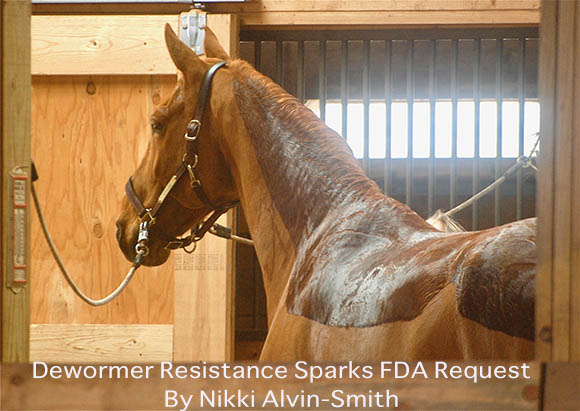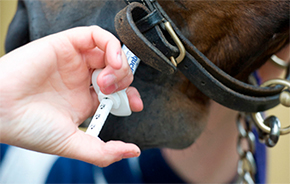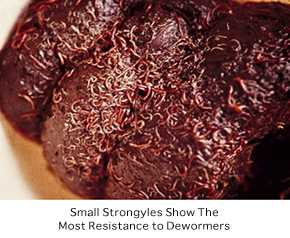Dewormer Resistance Sparks FDA Request
By Nikki Alvin-Smith

The FDA recently announced that antiparasitic resistance is an emerging animal health problem. The widespread use and misuse of both prescription and over-the-counter anthelmintics has created a sincere concern and that it potentially is so serious that it ‘threatens animal agricultural production’ in grazing animals.
To combat this issue the FDA has requested that animal drug companies voluntarily revise the product labels for their approved anthelmintics used in livestock. The idea behind the move is that the new information will help end-users, including vets and animal owners, better understand the proper use of anthelmintics and ways to monitor and slow down the development of antiparasitic resistance at the farm level.
Their statement is a big wake up call to horse owners, that have been blindly deworming their horses without an evidence based protocol in place and the FDA recommend all horse owners use equine fecal worm egg count testing both before deworming and after deworming, to ensure they do not have a resistant deworming issue emerging on their farm.
 Here’s what the FDA had to say, straight from the horse’s mouth:
Here’s what the FDA had to say, straight from the horse’s mouth:
“By relying solely on antiparasitic drugs for parasite control and using other non-sustainable management practices, such as treating entire herds and flocks based on set protocol instead of actual need, widespread resistance to all major families of broad-spectrum anthelmintics may develop in the near future. To help combat antiparasitic resistance, FDA has developed new labeling information for anthelmintics used in livestock and horses to raise awareness about resistance and increase end-users’ knowledge about appropriate use of these drugs in order to slow down the development of resistance.
The labeling information is not intended to replace the management recommendations that you develop with a specific animal producer or owner, or to direct your practice of veterinary medicine. Rather, the information focuses on how to properly incorporate anthelmintics into an overall internal parasite control program and how to slow down the development of antiparasitic resistance.
New Labeling Information about Antiparasitic Resistance
Cattle, Small Ruminants, and Horses
Antiparasitic resistance is particularly concerning in grazing species (cattle, sheep, goats, and horses). Because these animals are continually exposed to worm eggs on the pasture, they can have repeated parasite infections. FDA has requested that animal drug companies add the following statements to the labels of all anthelmintics for cattle, small ruminants, and horses:
• Parasite resistance may develop to any dewormer, and has been reported for most classes of dewormers.
• Do not underdose. Ensure each animal receives a complete dose based on a • current body weight. Underdosing may result in ineffective treatment, and encourage the development of parasite resistance.
• Treatment with a dewormer used in conjunction with parasite management practices appropriate to the geographic area and the animal(s) to be treated may slow the development of parasite resistance.
• Fecal examination {F.E.C.T.} or other diagnostic tests and parasite management history should be used to determine if the product is appropriate for the herd/flock, prior to the use of any dewormer. Following the use of any dewormer, effectiveness of treatment should be monitored (for example, with the use of a fecal egg count reduction test {F.E.C.R.T.} or another appropriate method).
• A decrease in a drug’s effectiveness over time as calculated by fecal egg count reduction tests may indicate the development of resistance to the dewormer administered. Your parasite management plan should be adjusted accordingly based on regular monitoring.”
 It is interesting to note that in countries such as Denmark, there is no availability of OTC (over-the-counter) anthelmintics and all such products are prescription only. It should be a concern to horse owners that the FDA might make the same protocol change in the U.S.A.. Naturally pharmaceutical companies would see a decline in their sales of dewormers as a result so perhaps the price of the products would rise. For those horse owners who rarely utilize the services of a vet, the lack of availability and convenience of the dewormers might result in more horses not receiving adequate treatment for worm control.
It is interesting to note that in countries such as Denmark, there is no availability of OTC (over-the-counter) anthelmintics and all such products are prescription only. It should be a concern to horse owners that the FDA might make the same protocol change in the U.S.A.. Naturally pharmaceutical companies would see a decline in their sales of dewormers as a result so perhaps the price of the products would rise. For those horse owners who rarely utilize the services of a vet, the lack of availability and convenience of the dewormers might result in more horses not receiving adequate treatment for worm control.
The onus is squarely on the horse owner to follow a targeted worm control program to minimize the speed of development of the dewormer resistance issue. The F.E.C.T and F.E.C.R.T. are more important today than ever, and responsible horse ownership necessarily requires us all to step back and take notice.
All laboratories that offer these tests are not created equal and it is important that the lab technicians are experienced in reading these tests accurately. Furthermore when a resistance issue is noted on the F.E.C.R.T. it is also prudent to speak with an equine parasitology expert, who is up to date on current issues and has experience in how to effectively resolve the issue. The timeline for retesting is also important as encysted stage worms may still be present in the host as part of their life cycle requires.
You may ask, what causes this parasitic resistance to dewormers? You’ve heard of Herbert Spencer’s ‘survival of the fittest’ and Darwin’s theories on evolution. Part of the survival process is successful reproduction. When you administer a dewormer product to your horse it will necessarily be most effective against the adult sexually active worms that are the most sensitive and it will leave behind those worms that are the most resistant. Now you have created a selective breeding situation. These resistant adult worms will now mate together to create more highly dewormer resistant worms. Whoops!
As a result, eventually the dewormer will become useless as a method for treatment of worms in that equine population and their environment. As horses move around from place to place, these resistant worms are spread on the pasture to other grazing herds.
 Dr. John Byrd of Horsemen’s Laboratory, a leading laboratory in testing equine fecal samples for worm egg counts (F.E.C.T), has this to share:
Dr. John Byrd of Horsemen’s Laboratory, a leading laboratory in testing equine fecal samples for worm egg counts (F.E.C.T), has this to share:
“There are only 3 classes of drugs available in the USA and there is already evidence that there is great deal of resistance to 2 classes in small strongyles. There is also some evidence of resistance in roundworms, and pinworms to the third class of drugs. Therefore we must make every effort to slow or stop further development of resistance.
Fecal egg counts are the most important tool to slow the development of resistance in horse parasites. Doing fecal egg counts and using the knowledge that the result provides to owners can determine when and which horses need to be dewormed. This will greatly reduce the selective breeding of parasites for resistance.”
So as a fellow horse owner and horse breeder I urge you to take heed of this warning and adjust your equine deworming protocol accordingly. Before it is too late!


